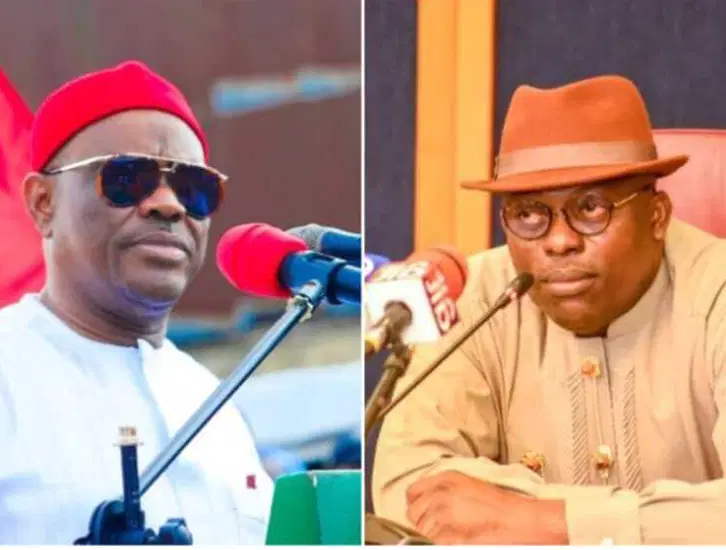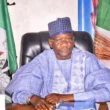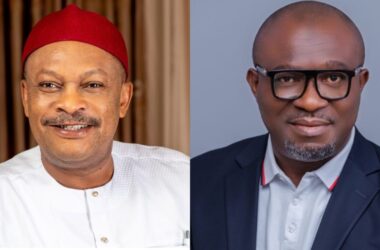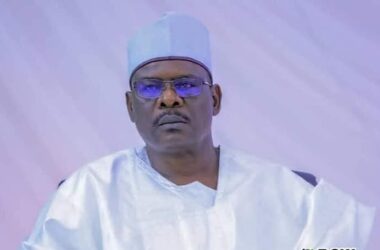Supporters of the suspended Rivers State Governor, Siminalayi Fubara, are not united in their views regarding the recent peace deal between him and the Minister of the Federal Capital Territory, Nyesom Wike.
While some see the development as a step forward for Rivers State, others believe the governor has bowed under pressure. The peace meeting, which was led by President Bola Tinubu on Thursday night, brought both leaders together in Abuja along with other political figures from the state.
The meeting took place at the Aso Rock Presidential Villa and also had in attendance Martin Amaewhule, the suspended Speaker of the Rivers State House of Assembly, and some lawmakers loyal to Wike. The goal, according to insiders, was to end the crisis that has affected governance in the oil-rich state for months.
According to those close to the Presidency, the agreement came with specific conditions. One major point discussed was that Fubara would not seek re-election in 2027. A source said, “It was one of the issues raised. In fact, it was the main issue. He agreed to conclude his tenure in peace and leave the stage after that.”
Another insider said, “Yes, they reached an agreement yesternight (Thursday). The goal is for peace to return to Rivers State. But I think Fubara got the shorter end of the stick.”
In addition, it was revealed that Wike would be allowed to choose chairpersons for all 23 local government areas in Rivers State.
After the meeting, Wike told journalists that the issues had been resolved and that both sides were ready to move forward in unity. “We are members of the same political family,” he said. He also noted, “Yes, just like humans, you have a disagreement, and then you also have time to also settle your disagreement. And that has been finally concluded today…”
Fubara also confirmed that peace had been achieved, calling the moment “a divine intervention” and promising to stick to the agreement for the benefit of the state.
However, the peace agreement has not been welcomed by everyone. Some of Fubara’s loyalists expressed deep concern over how the deal was arranged and what it could mean for the future of Rivers politics.
Dr. Leloonu Nwibubasa, a former Commissioner for Employment Generation and Economic Empowerment, said what took place was not reconciliation but rather a forced surrender. “What I see is not reconciliation. What I see is a surrender,” he told Saturday PUNCH. He noted that Fubara did not go to the meeting with any of his allies, unlike Wike who came with his full political team.
Nwibubasa added, “Where Governor Fubara walked alone to the Presidency without a single of his own supporters… tells you to what extent these very divisive and vicious Abuja politicians have gone to cow the governor into surrender.”
He also warned that the outcome could push Rivers State backward, saying the old political structure had been restored.
Similarly, a group known as the Rivers Emancipation Movement (REM) rejected the deal. In a strongly worded statement, the group said the peace move was “not in the interest of the people.”
Zoe Tamunotonye, the group’s National President, said, “This development marks the second Abuja-brokered reconciliation attempt. The first failed to yield any meaningful resolution…”
The statement continued, “REM unequivocally frowns at this so-called reconciliation in its entirety. It is nothing more than a hollow, self-serving political arrangement…”
They believe the peace deal was designed to protect the personal interests of a few political leaders rather than address the problems affecting Rivers residents.
Political activist and commentator Deji Adeyanju also shared his doubts about the sincerity of the deal. According to him, Wike’s past behavior suggests that the agreement won’t last. “Wike has proved time and again that his word holds no weight,” he said.
Adeyanju recalled Wike’s actions during previous political disputes and argued that his loyalty was always to his personal ambition, not to peace or teamwork. “Governor Fubara must prepare his mind that this reconciliation is a trap, and not a truce,” he warned.
Not everyone sees the peace move in a negative light. Jerry Omatsogunwa, the Special Adviser to Fubara on Electronic Media, described it as a positive step. He said the state had suffered under emergency rule and political instability, and any move that could restore order should be welcomed.
“So now that the gladiators have said they are ready to sheath their swords for the peace of Rivers State, what else?” he asked.
Omatsogunwa added that respect should be given to the governor as the elected leader of over seven million people. “As it stands now, he is the one that holds the head of the cutlass… he is the leader of Rivers State,” he noted.
He said the peace agreement, if followed properly, could help bring back development, jobs, and better social services that had all been affected by the ongoing crisis.
Also sharing a similar view was Ogbonna Nwuke, a former member of the House of Representatives and former Commissioner for Information and Communications in Rivers State. Nwuke said the meeting was part of a long process of talks that had been taking place behind the scenes, many of them led by President Tinubu.
He said it was expected that the parties involved would attend the meeting in person without large entourages. “What happened yesterday (Thursday) was the climax of all of the efforts that have been made to restore understanding,” he noted.
When asked about the governor’s suspension and the emergency rule, Nwuke said he believed the recent agreement was the beginning of better things for the state. He said the final decision rests with the President, but he was hopeful things would return to normal soon.
The trouble between Wike and Fubara started soon after Fubara became governor in May 2023. By October that year, things had worsened when lawmakers loyal to Wike began impeachment actions against Fubara.
In response, the governor demolished the state House of Assembly complex after a fire incident and moved sessions to a temporary location. This marked the start of a deep power struggle that made governance difficult in Rivers State.
President Tinubu had earlier attempted to calm the situation in December 2023, but that peace deal fell apart. By March 18, 2025, the President declared a state of emergency, suspending Fubara and giving executive control to Vice Admiral Ibok-Ete Ekwe Ibas (retd.), a former Chief of Naval Staff.










